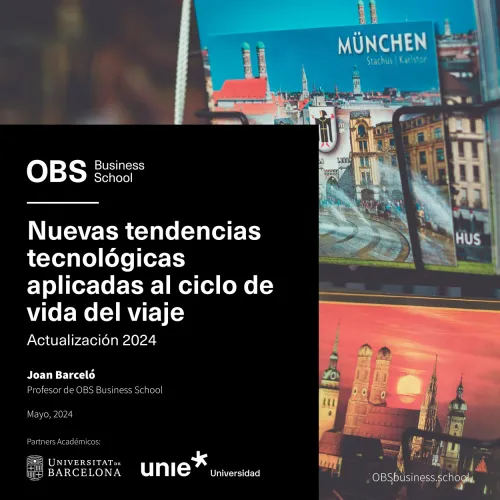
OBS Report: New technology trends in the travel lifecycle 2024
This year, 84% of Spanish tourists plan to maintain or increase their travel activities
- Shopping tourism, astro-tourism and home exchange are on the rise.
- 62% of travellers are on the lookout for bargains
- Generative AI could alleviate growing staff shortages in the travel industry, but travellers still prefer human support
- The incorporation of chatGPT into search platforms implies changing the information positioning strategy for products and services offered by companies in the sector. Other technologies such as augmented reality, virtual reality and the metaverse require quality content that is not yet being mass-produced.
June 2024. OBS Business School publishes the report Nuevas tendencias tecnológicas aplicadas al ciclo de vida del viaje (New technological trends applied to the travel lifecycle), directed by Professor Joan Barceló.
Tourism is one of the main economic, social and cultural drivers of our planet, generating every year the displacement of millions of people outside their usual environment for personal or professional reasons. In 2023 it accounted for 9.1% of world GDP and generated more than 348 million jobs. In the last 10 years, Spain has been one of the three most visited countries in the world, exceeding 85 million international visitors in 2023, according to the INE, a record figure since statistical records have been kept. In addition, Spain has also broken tourism spending records, reaching more than 108,662 million euros with an average of 1,278 euros per tourist. But although these figures are good, they have not yet reached the levels of 2019. The recovery is uneven across continents: Europe, the most visited region in the world, reaches 94%, Africa 96% and America 90%. On the other hand, Asia-Pacific stands at 65%, while the Middle East is the only region that exceeds the 2019 figures by 22%.
Trends among travellers
84% of Spanish travellers plan to travel the same or more this year than in 2023, and 76% will spend the same or more. According to the report, 55% of them prefer to go on a trip without completely closed plans, and up to 69% (48% in Spain) opt for flexible itineraries that they can change during the experience. 52% would be willing to go on surprise trips, without knowing the destination until the moment of arrival. As for the type of tourism, if until now there was cultural, ecotourism, rural, adventure, health, gastronomic (50% plan their trips around specific dishes or restaurants), coastal, urban, mountain, educational, musical, sporting or business tourism, now we can also add shopping tourism and astro-tourism, a form of travel in search of astronomical phenomena such as eclipses, meteor showers and northern lights.
With the consolidation of remote working, the number of people trying to move temporarily by combining a short holiday period with a long period of work from their chosen destination is increasing. As a result, we are seeing an increase in home exchange, which was already widespread in the United States. Platforms such as Home Exchange, Twin City, Kindred and Third Home are helping. And the trend is also reflected in hashtags such as #Homeswap or #Houseswap on the social networks TikTok and Instagram. Furthermore, 2024 confirms that influencers no longer only inspire, but also directly offer trips thanks to platforms such as Thatch, Trovatrip or GetYourGuide. Group travel and off-season trips are also on the rise, with lower costs and less saturation.
In terms of payment, 62% of travellers are awaiting offers. Interest in more flexible payment methods continues, from instalments to financing with deferred payments. There is also an increase in the number of insurance policies with different coverage options for all types of needs and travellers, especially those that apply before starting to travel and not only during the trip. Concern for sustainability continues to be a trend and travellers are interested in knowing their carbon footprint and having options to compensate or reduce it.
The rise of generative artificial intelligence
Generative AI has become popular despite the challenges and barriers to adoption and may be a key technology for the travel industry to address the challenge of growing staff shortages, yet travellers still prefer human support. As a result, companies in the industry are using it more for internal efficiency and productivity improvements, leveraging automation and employee assistance ‘co-pilots’, than for direct traveller interaction projects.
Internet users are increasingly asking more and more questions to chatGPT, but they are still far behind traditional search engines. Their incorporation into search platforms implies changing the information positioning strategy for products and services offered by companies. "In a context where access to information is multimodal, we have to start again or the information produced by companies will be invisible," says Professor Joan Barceló. Some cases of its use in the sector are: Expedia and Kayak, the only two companies included in the official ChatGPT plugins section. The former offers a travel search engine and uses generative AI in post-booking and customer services. The latter launched Kayak Price Check, a price checker based on a screenshot, and Ask Kayak, aimed at boosting text-based searches.
Other cases include World 2 Meet, the Iberostar Group's travel division, which presented at FITUR 2024 its digital ambassador Mía, a realistic synthetic avatar with a human appearance, trained with videos and audio from a member of the World2Fly cabin crew. Also Virgin Voyages, which introduced Jen-AI in 2023, a tool that allows travellers on its cruises to create a personalised invitation from Jennifer Lopez (JLo) to share with friends and family and convince them to travel. Cenizaro Hotels & Resorts, meanwhile, has just announced the creation of a virtual influencer, Sena Z, to inspire travellers to explore the world. Or Singapore Airline Group, which launched Pelago, a travel experience platform, in 2021. Travel planners such as Tripplanner, iPlan or Vacay Chatbot have also proliferated, supported by this technology.
New technological trends
Other technologies such as augmented reality, virtual reality and the metaverse can also contribute to making decisions, experiencing new sensations and reliving memories with maximum intensity, but they require quality content that is not yet being mass-produced. It is expected that generative AI can also positively impact their development. According to the OBS report, up to 43% of travellers would be willing to use virtual reality for inspiration and 46% are more likely to travel to a place if they have been able to experience it virtually before.
The generative AI embedded in SuperApps can be the ideal virtual assistant to monitor and complete the experience, in combination with 5G connectivity technologies and information provided by IoT and IoB devices. This combination enables the possibility of receiving suggestions and proposals in real time, from gastronomic activities based on preferences and visits made, to calculating the best route from a sustainability point of view, or avoiding crowded areas by offering alternatives that fit the traveller's preferences.
Other technologies include eVTOL or electric flying cars, which will start to be used during 2024 in major events such as the Olympic Games; and facial recognition techniques in airports to speed up security control and boarding, which are already a reality in some Spanish airports such as Madrid, Barcelona, the Balearic and Canary Islands.
Written by:
Carmen García-Trevijano
OBS Business School's Press Office

